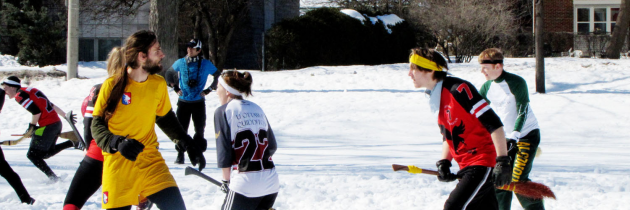Three Ottawa teams to compete at Quidditch World Cup
By Kiran Rana and Ariana Armstrong
Find an audio slideshow on the Carleton and Ottawa U Quidditch teams here.
Quidditch: imaginary no more
It started with a few Harry Potter fans running around on brooms at Middlebury College in Vermont in 2005. Now, nearly nine years later, Quidditch has evolved into an increasingly recognized sport across North America, with competitive teams and even a championship tournament.
Quidditch is the competitive sport that wizards play on flying brooms in J.K. Rowling’s popular series. In real life, Quidditch is a co-ed contact sport, which draws on elements from rugby, basketball and dodgeball: players tackle, dunk through hoops, and pelt each other with sports balls. And like the beloved game in Harry Potter, students play with broomsticks between their legs.
Seven players are on the field at any given time. Three players are “Chasers”, who run around the field and try to score points by throwing or dunking a ball called the “Quaffle” through any one of the three hoops on the opposite end of the field. Each goal is worth 10 points.
The “Keeper” defends the hoops. Meanwhile two team members called “Beaters” throw dodgeballs or “Bludgers” at members of the opposing team to disrupt the game.
Each team also has a “Seeker” whose goal is to catch the “Golden Snitch”. In the Harry Potter books, the Snitch is a miniature, flying, golden ball. In real life, the Snitch is a neutral player dressed in yellow who is allowed to run anywhere within agreed-upon boundaries. Catching the Snitch is worth 30 points and ends the game.
Players must keep the brooms between their legs at all times, otherwise they will be penalized. The standard broom used in tournaments is sold online by American company Alivans and costs $49.
Students at universities across Canada have transformed their favourite fictitious sport into a competitive game, starting with McGill University in 2008. Since then, Carleton University and the University of Ottawa have both joined in on the magic, and their teams will be heading to the 2014 World Cup in Myrtle Beach, S.C., next April.
The World Cup is a championship tournament hosted by the International Quidditch Association, a nonprofit established to govern the sport of Quidditch. The World Cup has been held annually since 2007. Each team pays an annual $40 membership fee to the IQA, and $400 registration fee if they qualify to compete in the World Cup.
Quidditch in the capital
It is 1 p.m. on a cold and snowy Saturday in November. A group of Carleton students dressed in running shoes, mittens and mismatched athletic gear are tossing dodgeballs around. Several broomsticks rest on the ground beside them.
Enter Carleton’s Quidditch team.
Carleton University Quidditch is one of two Quidditch teams on campus — the second is called Conspiracy —and they are one of four teams in Canada to qualify for the 2014 World Cup, along with McGill Quidditch and both of Ottawa U’s teams, the Gee-Gees and the Maple Rush.
“Everybody’s kind of a geek slash jock,” says Anthony McCanny, a fourth-year undergraduate student in religious studies. “They love Harry Potter but are interested in sports in some way.”
McCanny says that Carleton’s Quidditch team has come a long way from its first days in early 2010 when founder Andrea Hill took inspiration from the team at McGill University.
According to Jennifer Magel, president of the Carleton Quidditch team, the group currently practices twice a week but plans to implement a third practice in preparation for the next game.
In January 2011, Carleton’s love of Quidditch spread across town to the University of Ottawa when Carleton players helped set up a rival team.
“In my second year we created the Ottawa U team,” McCanny says. “There was only a couple of them and we trained them so they’ve always felt like our baby.”
“But then at last year’s World Cup they beat us… Frankenstein’s monster, that sort of thing,” he continues. “But I think in a rematch things will be close.”
Of the four teams from Eastern Canada that qualified for the 2014 World Cup, two of them were from Ottawa U: the Gee-Gees and the Maple Rush. Both teams are part of the university’s Quidditch Club.
Although it’s early on a Saturday morning and there’s snow on the ground. The Ottawa Gee-Gees are training hard. Co-founder and University of Ottawa graduate Claire Hutchinson leads the team through intense stretches and drills. After every set of three-man weaves, Hutchinson barks an order for the team members to drink water so they don’t get dehydrated.
After the exercises, some players pant in exhaustion, but most have a big smile on their flushed faces.
Hutchinson says the team repeats this drill at every practice, which they hold three times a week. The Gee-Gees also meet for an additional recreational practice every weekend.
According to Gee-Gees player Erin McCrady, a third-year student at the University of Ottawa, funding is still an issue for this relatively new club. She said that although the student federation grants them $1000 dollars, this has to be shared between the two competitive teams.
Last year, the Gee-Gees and the Maple Rush raised over $9000 together to help pay for their uniforms, equipment and travel fees.
“People come out thinking it’s nerds running around with a broom between their legs and it’s really not,” said Rebecca Alley, a fourth-year student and co-coach of the Gee-Gees team.
“I mean we are all nerds, and we do all run around with brooms between our legs, but it’s so much more than that.”
Cover photo by Victoria Putinski.

